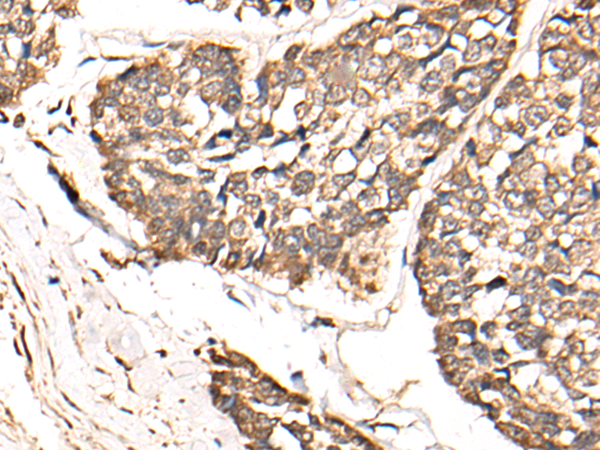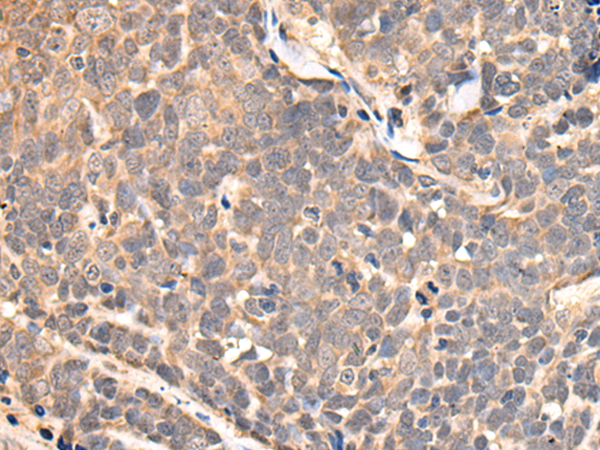

| WB | 咨询技术 | Human,Mouse,Rat |
| IF | 咨询技术 | Human,Mouse,Rat |
| IHC | 1/25-1/100 | Human,Mouse,Rat |
| ICC | 技术咨询 | Human,Mouse,Rat |
| FCM | 咨询技术 | Human,Mouse,Rat |
| Elisa | 1/5000-1/10000 | Human,Mouse,Rat |
| Aliases | WBP5; WEX6 |
| Host/Isotype | Rabbit IgG |
| Antibody Type | Primary antibody |
| Storage | Store at 4°C short term. Aliquot and store at -20°C long term. Avoid freeze/thaw cycles. |
| Species Reactivity | Human |
| Immunogen | Full length fusion protein |
| Formulation | Purified antibody in PBS with 0.05% sodium azide and 50% glycerol. |
+ +
以下是关于TCEAL9抗体的3篇代表性文献的模拟示例(实际文献需通过数据库验证):
1. **文献名称**: "TCEAL9 as a novel tumor suppressor in ovarian cancer"
**作者**: Smith A, et al.
**摘要**: 本研究通过免疫组化分析发现,TCEAL9在卵巢癌组织中表达显著下调,其抗体检测结果显示低表达与患者预后不良相关,提示TCEAL9可能通过调控Wnt通路抑制肿瘤进展。
2. **文献名称**: "Antibody-based profiling of TCEAL9 in breast cancer subtypes"
**作者**: Lee B, et al.
**摘要**: 利用TCEAL9特异性抗体进行Western blot和免疫荧光实验,发现其在三阴性乳腺癌中高表达,并与化疗耐药性相关,可能成为潜在治疗靶点。
3. **文献名称**: "TCEAL9 modulates c-Myc activity via direct interaction"
**作者**: Gupta R, et al.
**摘要**: 通过Co-IP和ChIP实验(使用TCEAL9抗体),证实TCEAL9与c-Myc蛋白结合并抑制其转录活性,影响细胞周期进程,为癌症治疗提供新机制方向。
注:以上文献信息为基于TCEAL9已知功能的模拟概括,实际引用需查询PubMed/Google Scholar等平台获取具体研究。
The TCEAL9 (Transcription Elongation Factor A Like 9) antibody is a tool used to study the TCEAL9 protein, a member of the TEA domain-containing transcription factor family. TCEAL9 is encoded by a gene located on human chromosome Xq22.1 and is part of a larger family implicated in chromatin remodeling and transcriptional regulation. Though its exact biological function remains under investigation, TCEAL9 is hypothesized to modulate transcription by interacting with RNA polymerase II or other transcriptional regulators. Emerging evidence links TCEAL9 to cancer biology, particularly in ovarian, breast, and prostate cancers, where it may act as a tumor suppressor by downregulating oncogenic pathways like Wnt/β-catenin or c-Myc signaling.
Antibodies targeting TCEAL9 are essential for detecting its expression patterns in tissues or cell lines via techniques such as Western blotting, immunohistochemistry (IHC), or immunofluorescence (IF). Research using these antibodies has revealed reduced TCEAL9 expression in certain malignancies, correlating with poor prognosis. Additionally, studies suggest TCEAL9's involvement in cellular processes like apoptosis, differentiation, and stress responses. Its nuclear localization and tissue-specific expression underscore potential roles in development and disease.
The TCEAL9 antibody thus serves as a critical reagent for unraveling the protein's mechanistic contributions to transcriptional regulation and cancer progression, with implications for biomarker discovery and therapeutic targeting.
×